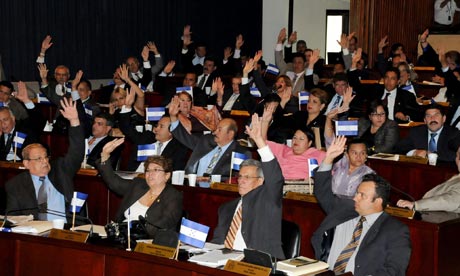skip to main |
skip to sidebar

The Honduran Congress voted overwhelmingly against restoring Mel Zelaya to the presidency to serve out the final two months of his term. At the time Zelaya agreed to the US-brokered deal he apparently believed he had the votes in congress to do so.
The next battle, though of little consequence now, focuses on turnout during Sunday's election. Zelaya's camp says that over 60% of voters stayed away from the polls in protest, the coup government claims 60% voted. Still another group of independent observers report that 48% of the electorate voted, similar to turnout in 2005. NDI's preliminary assessment of the election can be found here.
The Honduran Congress will vote on the deposed president's return on December 2. The US has signalled that they will accept the presidential elections scheduled for November 29 regardless of whether Zelaya is returned. This doesn't bode well for Zelaya's chances within the chambers of the obstinate legislative body. Here are some prospects for Honduras, the coup leaders, and Zelaya over the next several weeks.
With just under a month before scheduled elections in Honduras, and three months remaining before Mel Zelaya's presidential term expired, the Obama administration begrudgingly took leadership of negotiations and hammered out an agreement to return democratic order to the shunned nation. The administration could no longer position itself as just another member of a coalition of concerned nations in the region and I think they served themselves well by allowing for more home-grown efforts, such as those of the OAS and President Arias of Costa Rica, the opportunity to succeed first.
In the end, it was not economic sanctions or revoked visas that allowed for a breakthrough but enagaement and a self-acceptance of Washington's unique ability to get people to pay attention to their demands. This should serve as a timely reminder of the necessity of US power in the region and an argument for sustained engagement in the region, a point that Eric Farnsworth makes over at Americas Quarterly.
The New York Times has this to report:
During a half-hour telephone call last week, Secretary of State Hillary Rodham Clinton took a leading role, making it clear to Mr. Micheletti that the United States was growing impatient with the stalemate and demanding that democracy be restored. Mr. Micheletti later joked with his aides that she stuck so close to her message it appeared she had a limited vocabulary. “I kept trying to explain our position to her,” he said, according to officials close to the talks, “but all she kept saying was, ‘Restitution, restitution, restitution.’ ”
Honduras is not out of the penalty box yet, leaders in Congress are saying they're not a rubber stamp and both camps continue to bicker to the detriment of the fragile agreement. Though one can be certain that the presidential candidates, whose legitimacy depends on a quick resolution, would sure like to be.
A deal appears to have been reached between Mel Zelaya and the coup government of Roberto Micheletti. Secretary of State Clinton called it "an historic agreement" and had this to say from Pakistan (of all places to be brokering a deal on Honduras!):
“I cannot think of another example of a country in Latin America that, having suffered a rupture of its democratic and constitutional order, overcame such a crisis through negotiation and dialogue.”
The Honduran Congress must essentially ratify this deal in order to return Zelaya to power ahead of the November 29 election. And if they don't? Well, we'll cross that bridge when we get there. In turn, I imagine the world is ready to accept the legitmacy of the pending election and drop the sanctions imposed since Zelaya was expelled from the country in June.
 Y ahora que? Zelaya in the Brazilian embassy
Y ahora que? Zelaya in the Brazilian embassy
Narco News has this excellent report from the ground. Check in later for video of Micheletti's call for a curfew and further reports.
Radio Globo, one of the only media outlets in the country to stand up to the coup government and remain on the air, has more.


